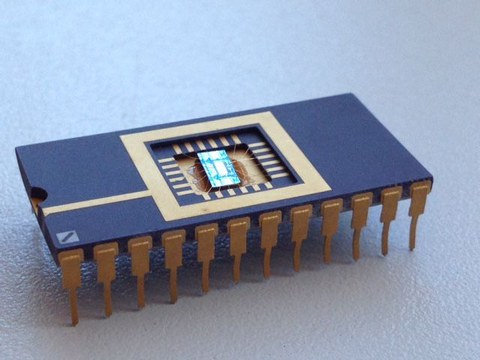Aug 22, 2016
Revolutionize electronic circuits – Chua Memristor Center founded in Dresden

A test chip of a memristor made by NaMLab (a TU Dresden company)
On August 22, 2016, the Chua Memristor Center (CMC) was launched in Dresden; it is a network of scientists in computer science, electrical engineering, physics and chemistry that research in the field of memristors. Memristors enable an entirely new and significantly more powerful type of electronic circuit than we know today. The application of memristors could therefore completely change the inner workings of computers. The CMC, founded by Prof. Ronald Tetzlaff and Prof. Thomas Mikolajick from the Technische Universität Dresden and Prof. Dietmar Fey from the Friedrich-Alexander-Universität Erlangen-Nürnberg, aims to pave the way for this revolution in the field of circuit technology.
Memristors are nanoelectronic devices, i.e. they are very small and therefore occupy only little space on a computer chip. For this reason, many of them can be packed very densely on a chip. "This allows much more main storage in a confined space. Thus, future devices can be significantly faster than the ones we know today. The computer would not boot up, but would be ready for operation at once when turned on – this would be a huge advantage for any user" Prof. Tetzlaff explains.
Memristor are able to learn. This characteristic makes them ideal for application in artificial brains: Computers can solve math problems faster than we can, but they are not able to think because they lack the analytical skills of the human brain. Current research projects – e.g. the Human Brain Project – are working on the development of artificial brains in order to enable computers to think. Due to their ability to learn, memristors could be applied in thinking computers.
Although the term "memristor" was used in 1971 for the first time, researchers from science and industry did not start concerning themselves intensively with the memristor before 2008. Some companies already apply memristors as storage, but the technology is not economical for mass production yet. The CMC therefore aims to bring researchers from various disciplines as well as from science and industry together in order to explore the scientific fundamentals of the memristor as well as to enable industrial application.
The Chua Memristor Center was named after Prof. Leon Chua from the University of California, Berkeley (USA) because he coined the term "memristor" in 1971. Still today, Prof. Chua is an important researcher in this field; he could be won for the scientific advisory board of the CMC. The advisory board consists of further top-class researchers: Prof. Dalibor Biolek from the Brno University of Technology and University of Defence (Czech Republic), Prof. Fernando Corinto from the Politecnico di Torino, Prof. Marco Gilli, rector of the Politecnico di Torino (Italy), Prof. Shahar Kvatinski from Technion – Israel Institute of Technology (Israel), Dr. Stanley Williams from Hewlett Packard Enterprise (USA) and the CMC-founding members Prof. Dietmar Fey, Prof. Thomas Mikolajick and Prof. Ronald Tetzlaff.
Media inquiries:
Prof. Dr. Ronald Tetzlaff
Faculty of Electrical and Computer Engineering
Professur für Grundlagen der Elektrotechnik
Tel.: +49 (0) 172 247 89 69
